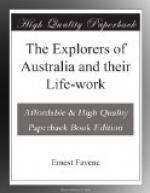This resolve was at once carried out. The boats were hauled up and secured together; all unnecessary articles were abandoned to suit the reduced means of transit; and at nine o’clock on May 18th they said farewell to this weary river and started to encounter fresh troubles under another guise. Instead of travelling in a superfluity of water they now found themselves straitened by drought, and the work began to tell upon the horses. Scrub, too, that besetting hindrance of so many Australian explorers, began to impede their onward path. Eucalyptus brush overrun with creepers and prickly acacia bushes united to bar the way, and when, after much toil and suffering, they at last reached the point of a range, which Oxley named the Peel Range, the leader had reluctantly again to change his mind and to abandon the idea of making south-west to the coast. Sick at heart of this sequence of disastrous happenings, he confided his feeling of sorrow to his journal.
“June 4th. Weather as usual fine and clear, which is the greatest comfort we enjoy in these deserts abandoned by every living creature capable of getting out of them. I was obliged to send back to our former halting-place for water, a distance of near eight miles; this is terrible for the horses, who are in general extremely reduced; but two in particular cannot, I think, endure this miserable existence much longer.
“At five o’clock two of the men whom I had sent to explore the country to the south-west and see if any water could be found, returned after proceeding six or seven miles; they found it impossible to go any farther in that direction, or even south, from the thick bushes that intersected their course on every side; and no water (nor in fact the least sign of any) was discovered either by them or by those who were sent in search of it nearer our little camp.
“June 5th. From everything I can see of the country to the south-west, it appears, upon the most mature deliberation, highly imprudent to persevere longer in that direction, as the consequences to the horses of want of grass and water might be most serious; and we are well assured that within forty miles on that point the country is the same as before passed over...Our horses are unable to go more than eight or ten miles a day, but even they must be assured of finding food of which in these deserts the chances are against the existence.”
On the following day, June 6th, Oxley, having changed his course to the west and north-west, made another effort to escape from the surroundings that so disheartened him. On the 4th of June, before leaving, Allan Cunningham planted some acorns and peach and apricot stones in honour of the King’s birthday. Upon this episode Oxley remarks, that they would serve to commemorate the day and situation, “should these desolate plains be ever again visited by civilised man, of which, however, I think there is very little probability.” All this only shows how the




